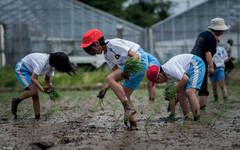Educators called on to join UNESCO Green Citizens’ Project at Paris Climate Conference 2015 (COP21)
Educators and practitioners worldwide working to promote sustainable development are invited to join UNESCO Green Citizens’ Project which will feature at the Paris Climate Conference 2015 (COP21).
The project, a partnership between UNESCO, Sipa Press and the Klorane Institute which highlights the crucial role education plays in ensuring the future of the planet, will form part of the UNESCO Pavilion at COP21, Paris Le Bourget from 30 November to 11 December.
At the project’s core is a participatory multimedia platform where educators and practitioners across the world can share their own projects, experiences and best practices related to Education for Sustainable Development and discover others.
A photography exhibition, Pathfinders for Change, focuses on eight emblematic initiatives which range from the transmission of indigenous knowledge in Nicaragua, to rice farming methods in Japan, sustainable fishing in France, protecting the coasts in the United States, performing arts to change behaviours in Vanuatu, a tea plantation empowering local communities in India, a wall of vegetation in Senegal and a recycling school in Egypt.
In a message UNESCO Director-General Irina Bokova said: “Stepping back and taking a moment to reflect amidst the whirlwind of information available, the UNESCO Green Citizens Project intends to re-appropriate the values behind our collective will to build a world we can all share. Men and women everywhere are committed to our planet, proposing ideas and projects that can revolutionize the future. They are forerunners of a new form of humanism. These pathfinders are shaping tomorrow’s world, taking inspiration from the past to meld traditions with innovations.”
Throughout COP21, conferences, panels and meetings will be taking place under the auspices of UNESCO to shed light on the many ways education contributes to Sustainable Development.
Through the Global Action Programme (GAP) on Education for Sustainable Development UNESCO seeks to generate and scale-up concrete actions in ESD and follow up on its work carried out during the United Nations Decade of Education for Sustainable Development (2005-2014).
The education community further stressed its commitment to ESD in the Education 2030 Framework for Action with Target 4.7 which aims to educate, raise awareness and transmit best practices on ESD by promoting a use of resources that limits climate change, decreases the risk of natural disasters, favours cultural diversity, gender equality and health, reduces poverty, increases biodiversity and bolsters peace.
LINKS
International Seminar - Getting climate-ready: ASPnet schools’ response to climate change
<- Back to: All news




